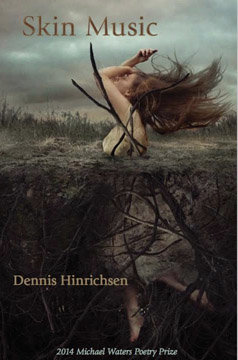 Lansing-based poet Dennis Hinrichsen doesn’t miss a beat in his new book, “Skin Music,” sometimes cutting with the precision of a scalpel, other times shape-shifting like an amoeba in the collection of 24 poems.
Lansing-based poet Dennis Hinrichsen doesn’t miss a beat in his new book, “Skin Music,” sometimes cutting with the precision of a scalpel, other times shape-shifting like an amoeba in the collection of 24 poems.
“Skin Music” is Hinrichsen’s fifth collection of poetry. It proves that his retirement from Lansing Community College in 2013, after teaching for nearly three decades, has been good for him. It’s also good for poetry readers.
The poem “Dialysis” describes his mother’s dialysis treatment with both lyricism and scientific precision. This comes easily for Hinrichsen, who spent the first 10 years of his writing career as a technical writer. Hinrichsen said poetry has been part of his life since high school, when he walked away from a deadly car accident which killed several others.
“I was known as the car accident boy,” he said. “This was before any grief counseling. I came to poetry out of wound.”
He wrote extensively about the car crash in his second book, in what he calls the “car accident poems.”
“I went back to a high school class reunion where I was still called car crash boy,” he said. “I had evolved so much, but they didn’t see it.”
His life experiences often find their way into his poems, from his recent bout with cancer to his reflections on a neighborhood child molester. His second collection of poetry, “Kurosawa’s Dog,” explores his complex relationship with his father.
“You translate your experiences into art with horizontal and vertical energy,” Hinrichsen explained.
Hinrichsen didn’t just jump into poetry. His first choice as an undergrad at Western Michigan University was math, but he quickly transferred into creative writing.
Talking with Hinrichsen on a recent afternoon in Old Town turned into a beautiful lesson in poetic construction, in all its often brutal and beautiful forms. Poetry that appears to run hither and thither across the page becomes more understandable when he describes it. And when he compares the writing of poetry to writing song lyrics, a light bulb comes on.
“In music and poetry, if you say something three times it means something,” he said. “Say it four times, and it leaves you wondering.”
Hinrichsen said he was asked to teach song lyric writing several times at LCC, but always said no. He finally relented and found it to be an eye-opening experience, especially as it related to his own poetry. He compares music theory to a poet’s techniques: improvisation, phrasing and rhythm all work together in both disciplines. To better understand music, Hinrichsen began playing the guitar.
“It completely changed how I thought about my own work, he said. “Finally, you figure it out and then you retire.”
Hinrichsen cited the energetic opening riff of the Rolling Stones’ “Start Me Up,” and explained that poetry can elicit that same reaction. Continuing the rock music comparison, Hinrichsen compared his writing evolution to that of a rock group that starts out as a garage band.
“You are full of energy, risk and wildness. You are not just repeating the same old thing,” he said. “You should be in a garage band when you’re 75. That would be success.”
Hinrichsen, who also earned a master’s degree in fine arts from the University of Iowa, said poetry has changed dramatically during his career. He credits online magazines and other digital formats for the diversity of voices in poetry today.
“Growing up, poetry was monolithic. Mostly older guys dictated what would get published,” he said. “Today there are 100,000 voices and democratizing outlets.”
A Nov. 8 New York Times front page article on the future of poetry complements his observation. The article follows several poets whose careers have taken off on the web and social media. One poet, Tyler Knott Gregson, sold more than 120,000 copies of his book, “Chasers of the Light,” after being discovered on the web. Traditionally released poetry books often sell in the low thousands, even if the author a national award winner.
Hinrichsen said that his writing is firmly grounded in his Midwestern upbringing, and he cites Phil Levine and Richard Wright as a few of as his muses. His lead poem in “Skin Music,” “Variations on the Death By Drowning of the Poet Paul Celan,” has a certain kinship with Walt Whitman and Allen Ginsberg.
Hinrichsen will make an appearance 3 to 5 p.m. Sunday at Old Town’s MICA Gallery where he’ll be joined by fellow poet Kathleen McGookey. The two will read and discuss their poetry. Hinrichsen said that he enjoys opportunities to perform poetry live, something that has become less common in the modern literature scene.
“You’re the writer, P.T. Barnum and the bookstore all rolled up,” he said.
Poetry reading/ publication party
With Dennis Hinrichsen and Kathleen McGookey 3-5 p.m. Sunday, Nov. 15 FREE MICA Gallery 1210 Turner St., Lansing (517) 371-4600, micagallery.org
Support City Pulse - Donate Today!
Comments
No comments on this item Please log in to comment by clicking here